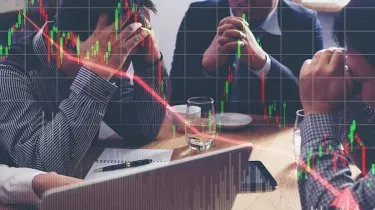ROOT
‘Savage’ stock sell-off isn’t without reason, says State Street
According to the firm, the sell-off is consistent with the long-term preferences of investors.
‘Savage’ stock sell-off isn’t without reason, says State Street
According to the firm, the sell-off is consistent with the long-term preferences of investors.

State Street Global Advisors has issued its evaluation of the recent market correction and examined the opportunities available to investors in a new note released on Monday.
The firm’s head of portfolio management – Australia active quantitative equities, Bruce Apted, described the sell-off as “savage”, but noted that it had “largely been rational” with investors acting in line with their longer-term preferences.
“We expect investors to prefer less expensive companies and to prefer high quality proven business models and to favour companies that have improving outlooks,” he said.
“Year to date, these investor preferences have dominated stock selection and there is little evidence of the baby being thrown out with the bathwater.”

Mr Apted noted that the excess return from owning value so far in 2022 was 18.0 per cent, along with 7.3 per cent for quality and 5.2 per cent for sentiment.
This was also reflected for the most sold-off sectors - technology and consumer discretionary - across value (13.8 per cent), quality (9.0 per cent) and sentiment (7.7 per cent).
“The recent correction is renormalising the market back towards fundamentals after many years of distorted mispricing of securities,” said Mr Apted.
Looking back to the difference in price earnings ratios between the most expensive and least expensive stocks since the technology bubble, Mr Apted said, provides insights on the extent of the mispricing within value companies.
“We have definitely seen the most expensive companies de-rate but using the 2000 experience as a guide there is still room for the most expensive names to de-rate further and for the cheaper companies to re-rate higher,” he said.
“The ‘buy the dip’ mentality appears to be alive and well and we have not as yet seen capitulation from investors buying into expensive growth.”
For those investors looking for opportunities after the market sell-off, State Street indicated that it had not found any obvious areas of mispricing.
“In what may appear somewhat contrary, we continue to prefer some of the sectors that have outperformed year to date,” explained Mr Apted.
Within the technology sector, the firm maintained its preference for technology hardware and storage, noting its comparative outperformance in 2022 with a fall of 15 per cent.
Software remains one of the firm’s least preferred areas even after falling 34 per cent so far this year, while within the consumer discretionary sector, internet and direct marketing is still one of State Street’s least preferred following a 44 per cent decline.
“Looking forward, we prefer some of the more defensive sectors including communication services, multi-utilities and healthcare service providers,” Mr Apted added.
“On the cyclical side, we prefer a number of industrial subgroups including construction and engineering, marine and trading companies.”

Invest
Hall Chadwick to host exclusive capital access forum in Singapore for APAC corporates
In an effort to navigate the complexities of global capital markets, Hall Chadwick, an Australian-founded professional services firm with a 138-year legacy, is set to host an exclusive investment ...Read more

Invest
HarbourVest Partners strengthens global marketing with new leadership appointment
In a strategic move to bolster its global marketing efforts, HarbourVest Partners, a renowned private markets investment specialist, has appointed Michelle Han as the Head of Global ex-US MarketingRead more

Invest
Finity and Ortec Finance join forces to enhance climate risk analysis for Australian investment portfolios
In a significant move aimed at bolstering the financial sector's ability to tackle climate-related risks, Finity, Australia's leading independent actuarial and strategic analytics firm, has announced ...Read more

Invest
Australia’s 5% deposit guarantee accelerates: relief for buyers, reckoning for lenders
Bringing forward Australia’s expanded 5% deposit guarantee to 1 October 2025 changes the mechanics of first-home finance and the economics of mortgage risk overnight. By removing income caps and place ...Read more

Invest
Australia's performance test shake-up is rewriting the investment playbook
Australia’s performance test has been a powerful accountability tool—exposing laggards and accelerating consolidation. But industry bodies now back targeted reforms to stop the test from ...Read more

Invest
Financial Basics Community Foundation receives major grant to boost financial literacy for disadvantaged youth
In a significant step toward enhancing financial literacy among disadvantaged young Australians, the Financial Basics Community Foundation (FBCF) has secured a substantial grant from the MetLife ...Read more

Invest
Dynamoney appoints Brett Thomas as CEO to spearhead growth and innovation
Dynamoney, a prominent player in the commercial finance sector for Australian small and medium enterprises (SMEs), has announced the appointment of Brett Thomas as its new Chief Executive OfficerRead more

Invest
Brokers’ wishlist, nation’s payoff: approvals, tax and AI as the new housing‑finance flywheel
Mortgage brokers aren’t just pleading sectoral special interests. Their asks—faster planning approvals, targeted tax recalibration and scaled AI—are levers to lift national productivity, unlock ...Read more

Invest
Hall Chadwick to host exclusive capital access forum in Singapore for APAC corporates
In an effort to navigate the complexities of global capital markets, Hall Chadwick, an Australian-founded professional services firm with a 138-year legacy, is set to host an exclusive investment ...Read more

Invest
HarbourVest Partners strengthens global marketing with new leadership appointment
In a strategic move to bolster its global marketing efforts, HarbourVest Partners, a renowned private markets investment specialist, has appointed Michelle Han as the Head of Global ex-US MarketingRead more

Invest
Finity and Ortec Finance join forces to enhance climate risk analysis for Australian investment portfolios
In a significant move aimed at bolstering the financial sector's ability to tackle climate-related risks, Finity, Australia's leading independent actuarial and strategic analytics firm, has announced ...Read more

Invest
Australia’s 5% deposit guarantee accelerates: relief for buyers, reckoning for lenders
Bringing forward Australia’s expanded 5% deposit guarantee to 1 October 2025 changes the mechanics of first-home finance and the economics of mortgage risk overnight. By removing income caps and place ...Read more

Invest
Australia's performance test shake-up is rewriting the investment playbook
Australia’s performance test has been a powerful accountability tool—exposing laggards and accelerating consolidation. But industry bodies now back targeted reforms to stop the test from ...Read more

Invest
Financial Basics Community Foundation receives major grant to boost financial literacy for disadvantaged youth
In a significant step toward enhancing financial literacy among disadvantaged young Australians, the Financial Basics Community Foundation (FBCF) has secured a substantial grant from the MetLife ...Read more

Invest
Dynamoney appoints Brett Thomas as CEO to spearhead growth and innovation
Dynamoney, a prominent player in the commercial finance sector for Australian small and medium enterprises (SMEs), has announced the appointment of Brett Thomas as its new Chief Executive OfficerRead more

Invest
Brokers’ wishlist, nation’s payoff: approvals, tax and AI as the new housing‑finance flywheel
Mortgage brokers aren’t just pleading sectoral special interests. Their asks—faster planning approvals, targeted tax recalibration and scaled AI—are levers to lift national productivity, unlock ...Read more








